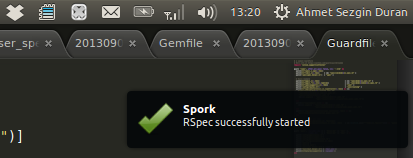Bir önceki yazımda Rails’de RSpec testlerini Guard ile otomatikleştirmeyi anlatmıştım. Başlangıç için iyi bir çözüm fakat geliştirilen proje büyüdükçe yapılan anlık testler yavaşlamaya başlıyor. Tabi her iş için bir gem bulunan Ruby-Rails aleminde, bunun için de bir gem var: Spork
Spork, Ruby yazılımlarının test sistemleri (RSpec, Cucumber, vs.) için geliştirilen bir DRb sunucusudur. Standart şekilde test dosyalarını yükleyip kaldırmak yerine bunları önbellekte tutar ve her testte sunucunun yeni bir fork’unu oluşturur. Sonuç? Hızlı ve güvenli 🙂 Yalnız uyarayım, Spork gemi, Ruby’deki Kernel.fork methodunu kullanıyor ve bu method da sadece UNIX benzeri sistemlerde (Linux, BSD, OSX) çalışıyor. Kısacası bu araç Windows’da çalışmayacak.
Spork gemini kurup projeye dahil etmek için Gemfile dosyasını açın ve şu satırı ekleyin:
1 2 3 4 5 6 7 | group :development, :test do_ ... ... gem 'spork-rails', github: 'sporkrb/spork-rails' gem 'guard-spork', '1.5.0' gem 'childprocess', '0.3.6' end |
Ardından gemleri yükleyelim:
1 | $ bundle install |
Spork’u kurduk. İlk açılış ve yapılandırma için aşağıdaki komutu vermemiz lazım:
1 | $ bundle exec spork --bootstrap |
Test sistemine Spork’u dahil etmek için spec/spec_helper.rb dosyasını açın ve aşağıdaki ile birebir değiştirin:
1 2 3 4 5 6 7 8 9 10 11 12 13 14 15 16 17 18 19 20 21 22 23 24 25 26 27 28 29 30 31 32 33 34 35 36 37 38 39 40 41 42 43 44 45 46 47 48 49 | require 'rubygems' require 'spork' Spork.prefork do ENV["RAILS_ENV"] ||= 'test' require File.expand_path("../../config/environment", __FILE__) require 'rspec/rails' require 'rspec/autorun' # Requires supporting ruby files with custom matchers and macros, etc, # in spec/support/ and its subdirectories. Dir[Rails.root.join("spec/support/**/*.rb")].each {|f| require f} # Checks for pending migrations before tests are run. # If you are not using ActiveRecord, you can remove this line. ActiveRecord::Migration.check_pending! if defined?(ActiveRecord::Migration) RSpec.configure do |config| # ## Mock Framework # # If you prefer to use mocha, flexmock or RR, uncomment the appropriate line: # # config.mock_with :mocha # config.mock_with :flexmock # config.mock_with :rr # Remove this line if you're not using ActiveRecord or ActiveRecord fixtures config.fixture_path = "#{::Rails.root}/spec/fixtures" # If you're not using ActiveRecord, or you'd prefer not to run each of your # examples within a transaction, remove the following line or assign false # instead of true. config.use_transactional_fixtures = true # If true, the base class of anonymous controllers will be inferred # automatically. This will be the default behavior in future versions of # rspec-rails. config.infer_base_class_for_anonymous_controllers = false # Run specs in random order to surface order dependencies. If you find an # order dependency and want to debug it, you can fix the order by providing # the seed, which is printed after each run. # --seed 1234 config.order = "random" config.include Capybara::DSL end end Spork.each_run do # This code will be run each time you run your specs. end |
Teknik olarak yapmamız gerekenler bu kadar. Guard’dan ayrı bir şekilde ikinci bir terminalde şu komutu verdiğimizde, Spork çalışacaktır:
1 | $ bundle exec spork |
Tabi RSpec testlerini kapsaması için ufak bir ayar daha çekeceğiz. Proje ana klasöründeki .rspec dosyasını açın ve sonuna yeni bir satır olarak şunu ekleyin:
1 | --drb |
Artık bundle exec spork ile başlattığımız Spork, tüm RSpec testlerini kapsayacak. Bu sistemi daha da kullanışlı hale getirmek için Guard ile Spork’u bütünleştirebiliriz. Bunu yapmak için ana klasörde şu komutu verin:
1 | $ bundle exec guard init spork |
Ardından Guardfile dosyasına ekleme yapacağız. Öncelikle en alt satıra komple şu bloğu yapıştırın:
1 2 3 4 5 6 7 8 9 10 11 12 13 14 | guard 'spork', :cucumber_env =>; { 'RAILS_ENV' =>; 'test' }, :rspec_env =>; { 'RAILS_ENV' =>; 'test' } do watch('config/application.rb') watch('config/environment.rb') watch('config/environments/test.rb') watch(%r{^config/initializers/.+.rb$}) watch('Gemfile') watch('Gemfile.lock') watch('spec/spec_helper.rb') { :rspec } watch('test/test_helper.rb') { :test_unit } watch(%r{features/support/}) { :cucumber } end |
Şimdi ise guard ‘rspec’ ile başlayan bloğun “sadece başını” değiştireceğiz:
1 | guard 'rspec', after_all_pass: false, cli: '--drb' do |
Bu kadar 🙂 Proje klasöründe bir terminal açın ve bundle exec guard komutunu verin. Bundan sonra Guard ve Spork, bütünleşik olarak çalışacak:
